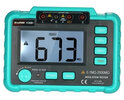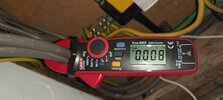I have an old Mega can't remember model number some 50 years old, and also have a new insulation tester

around 5 years old, both with test insulation, but the Mega also tests low ohms with the 200 mA required, however the new meter cost £35 where the Mega likely back in the 80's when I got it likely cost around £150.
But I use my meter for DIY, and I have no need to have any paperwork to say calibrated, they both give nearly the same reading when using a 1 MΩ resistor so as far as I am concerned both do the same job. As to low ohms my standard multi-meter does not use between 4 V and 24 V, d.c. or a.c., and a short-circuit current of not less than 200 mA.

However it is good enough for most DIY work, I don't have a loop impedance tester, it died, but I can borrow one when required.
As to calibration in the main meters are not calibrated they either pass or fail to fall into the range permitted, if they fail it's a new meter job. However one would hope meters can be calibrated. But I have never tried to calibrate one, so what is the big point when using a meter what ever meter it is for your job, is if likely to drift beyond the limits, and if it does can it be corrected?
It also raises the point if one finds it is out of the permitted range, what does one do? If it has not been calibrated for a year, does one return to all jobs done in the last year and retest? I would always test a know socket for loop impedance at least once a week, and had a 1 MΩ resistor to test the insulation tester, and for voltage I had a collection of meters and would look to see if they all show the same. So when my loop tester failed I only had 2 measurements which had been made with it since tested on the socket with known result.
At £35 if my insulation gives bad results I will buy another, at £1000 I want to send it for repair and calibration. What would be of interest is to hear how many people have sent meters away for calibration and actually been told it was out of spec by x amount and this has now been corrected?
I have only had one meter actually a PAT tester where I have sent it away (second time) and was told it was set to an old standard and was passing items at 100 kΩ (I think from memory) and it could not be changed to the new standard which was 1 MΩ so I would need a new PAT tester, in 2000 this was, and the same calibration house had pass it as OK 5 months earlier when it was also 1 MΩ as a pass.
Which begs the question why bother with calibration houses? However I have never opened up a insulation tester, so have no idea how easy to calibrate, and it is the ability to calibrate which is why we pay high prices for the instruments. So who has had a meter go out of calibration and had it repaired, rather than by new?




